What to Do When LETTING IT GO Is Too Difficult
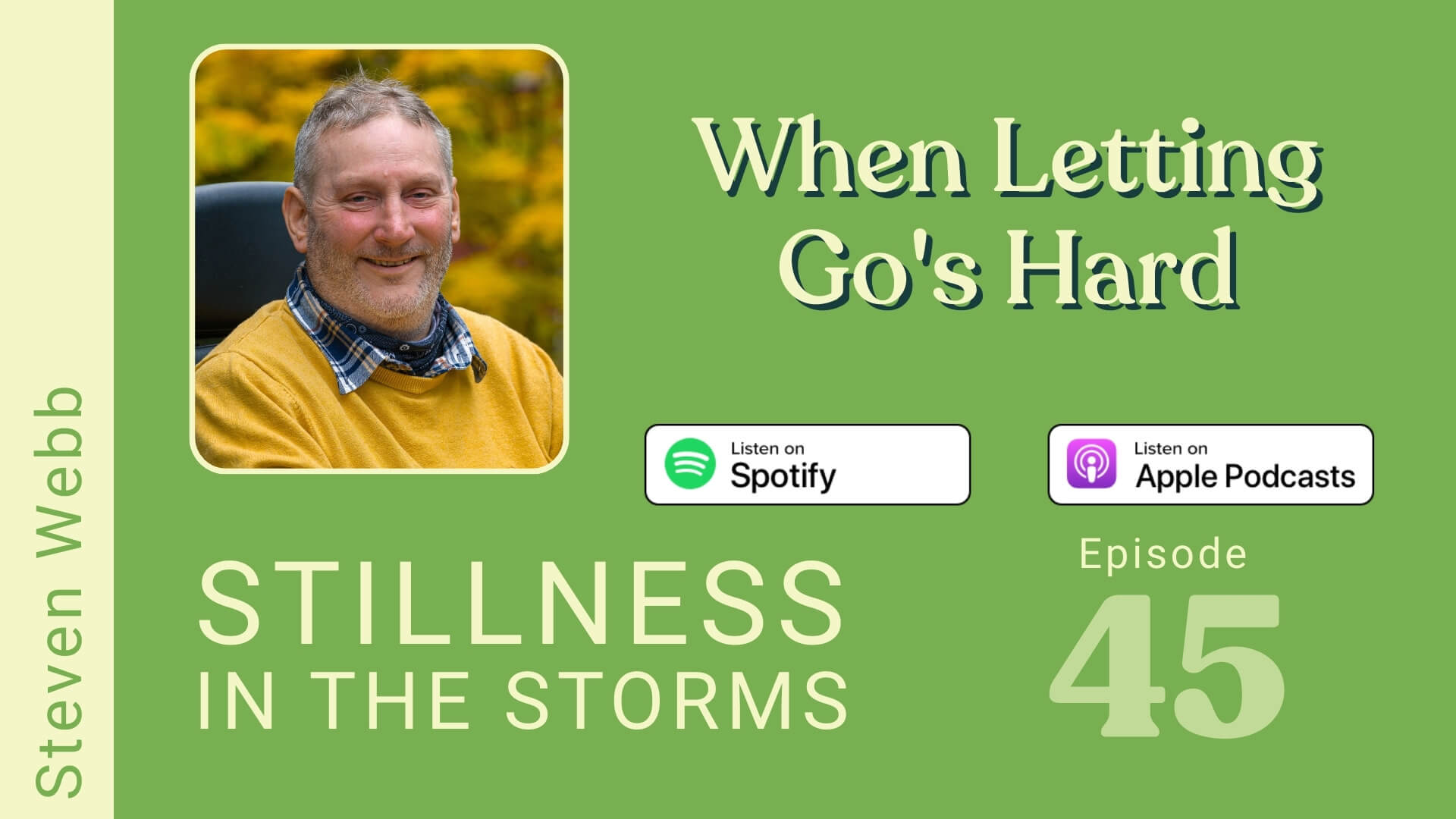
The advice ‘let it go’ seems to be everywhere. I’ve even given that advice myself to others and tried to do it myself. However, there is a way better way than trying to let things go. In today’s podcast Steven Webb, your host teaches you a different way through his unique humour and perspective.
Your Knowledge Is Worthless If You…
Links to Steven Webb’s podcast and how you can support his work.
- Donate paypal.me/stevenwebb or Coffee stevenwebb.uk
- Steven’s courses, podcasts and links: stevenwebb.uk
I just spilled some beans about my book-buying habits and how they connect to a bigger issue: knowledge is pretty much useless if we don’t take action. I mean, I’ve got shelves full of books and all these Audible titles, yet I often find myself scrolling through social media instead of actually reading them. We all know we should be making healthier choices, but when it comes down to it, we often reach for convenience instead. It’s like, we buy the books and have all this good intention, but if we don’t do anything with that knowledge, it just sits there collecting dust. So, let’s chat about how we can stop just accumulating knowledge and start putting it into practice in our lives.
This is a big confession time, and I bet you do the same thing again and again. We do all these things and we know better, why don’t we do better? In this podcast, Steven Webb discusses why knowledge is worthless if you don’t do anything with it.
Takeaways:
- I recently realized that simply buying books won’t change my life unless I actually read them and apply what I’ve learned.
- Knowledge is totally useless if we don’t put it into action and practice what we’ve learned in our lives.
- It’s easy to get distracted by instant gratification instead of focusing on long-term improvements and self-help practices.
- I’ve discovered that knowledge alone isn’t enough; we need to actively engage with it to see real change in our lives.
- When we buy self-help books, it’s important to commit to implementing their lessons rather than just accumulating them on our shelves.
- The journey of self-improvement starts with taking action based on the knowledge we gain from our readings and experiences.
Confessing a little habit of mine today: I buy a ton of books. Seriously, I just jumped on Amazon and snagged a couple more, thinking they’re going to fix my life. One was even called “Unfuck My Life”—I mean, how could I resist that? But here’s the kicker: I’ve got a whole library of books, and you’d think I’d be living my best life if I actually read them. I mean, I could probably write a book on how to collect books and do nothing with them. We all have this intention to improve ourselves, right? We buy the healthy stuff at the grocery store but end up tossing half of it because we’re too tempted by takeout. It’s like we’re all on this treadmill of purchasing knowledge but never really using it. Yeah, I get it—knowledge is power, but only if you actually do something with it. It’s not enough to just read; you have to apply what you learn. So, let’s stop buying the next self-help book until we’ve put what we learned from the last one into action. That’s the real challenge. Let’s get practical and make knowledge work for us.
Your Knowledge Is Worthless If You…
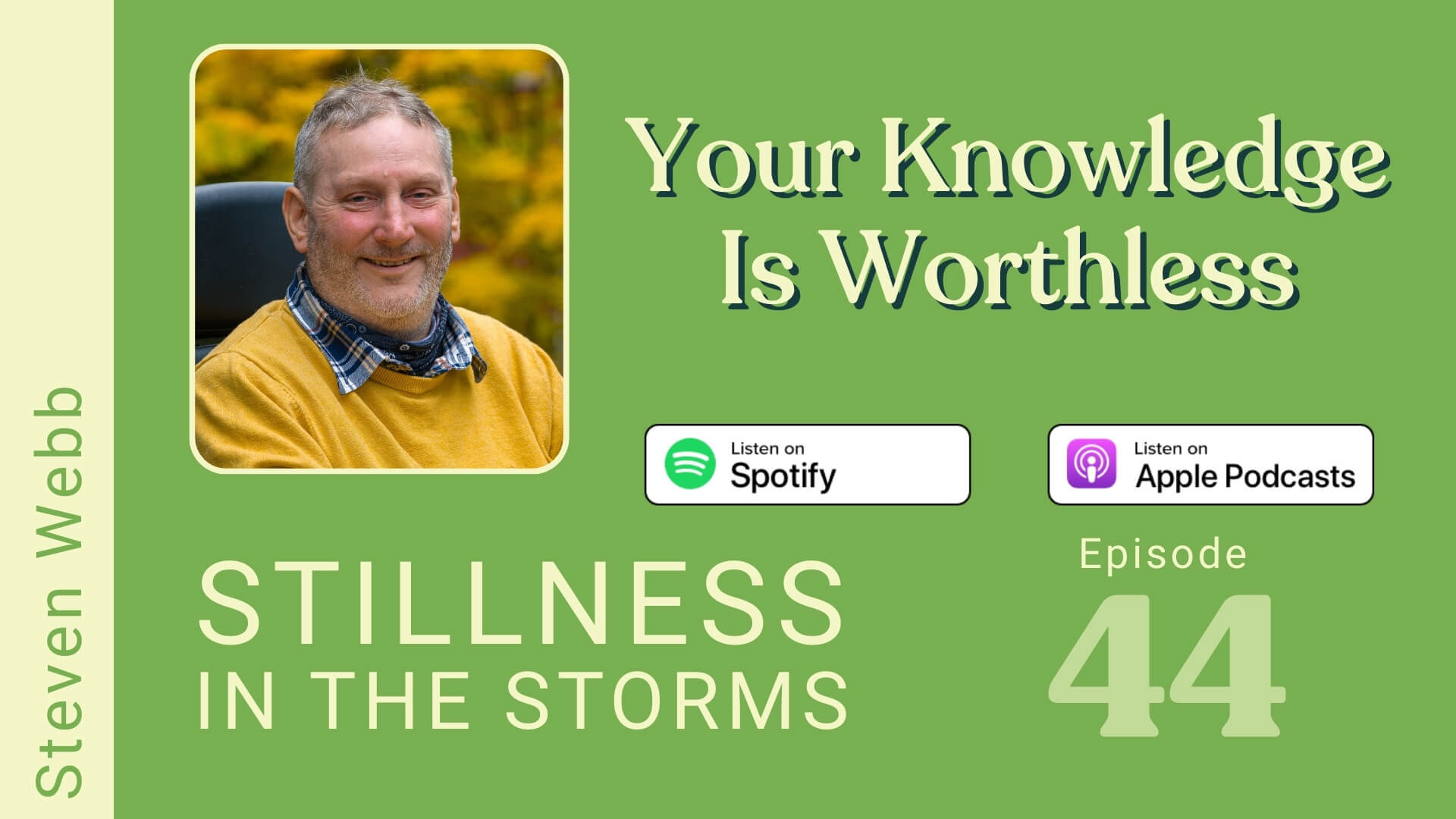
This is a big confession time, and I bet you do the same thing again and again. We do all these things and we know better, why don’t we do better? In this podcast, Steven Webb discusses why knowledge is worthless if you don’t do anything with it.
I really didn’t want to do this
Links to Steven Webb’s podcast and how you can support his work.
- Donate paypal.me/stevenwebb or Coffee stevenwebb.uk
- Steven’s courses, podcasts and links: stevenwebb.uk
I’m feeling a bit anxious today, and I want to share that with you. Even though I help people manage their stress and anxiety, I still experience those feelings myself. Today, I found myself avoiding life by watching random videos on YouTube instead of dealing with my tasks. It’s easy to get caught up in those moments of escapism, but I realized that acknowledging my feelings is crucial. In this conversation, we’ll explore how we all face our own storms, and what we can do to find stillness amidst the chaos. Let’s dive in and see how we can navigate these feelings together.
Now and again, you have one of those days, and this was one of them. I really couldn’t be bothered to do anything, let alone record a podcast.
Stress and anxiety can creep in on even the best of days. As I sit here feeling anxious and overwhelmed, I share that it’s a universal experience, even for those who help others manage their stress. We all face moments of doubt and avoidance, and I’m no exception. This podcast dives into the feeling of wanting to hide from the world and the struggle of confronting those feelings head-on. I share my recent experiences of procrastinating and avoiding responsibilities, like scrolling through YouTube instead of dealing with my emails. It’s all too easy to get caught up in distractions, but recognizing this behavior is the first step towards addressing it.
During this episode, I reflect on how life can feel overwhelming, even when it seems like everything is fine. The anxiety doesn’t always have a clear cause, and sometimes, it just sneaks up on us. I discuss how I’ve learned to observe my feelings and reactions, and how this awareness can lead to better coping mechanisms. We talk about the importance of showing up for ourselves and the power of doing something constructive, like recording this podcast, to help shift our mindset. It’s a reminder that we all deal with stress and anxiety, and it’s okay to feel that way sometimes.
The conversation also touches on the idea that we’re all just a few pages ahead in our life stories. No one has it completely together, and even those who seem to have it all figured out have their struggles. By sharing my own vulnerabilities, I hope to encourage listeners to acknowledge their feelings and take steps to overcome them. Life is about navigating through the storms, and the tools we build for ourselves can help us feel more equipped to face those challenges.
Takeaways:
- Feeling anxious and overwhelmed is something everyone experiences, even those who help others.
- We often avoid our responsibilities by distracting ourselves with things we don’t care about.
- Recognizing our feelings and taking action is more important than simply feeling overwhelmed.
- Life is unpredictable; despite our coping strategies, storms will still come our way.
- The key to managing anxiety is to observe our behavior and respond constructively, not reactively.
- It’s okay to feel stressed; what matters is how we choose to deal with those feelings.
I really didn’t want to do this
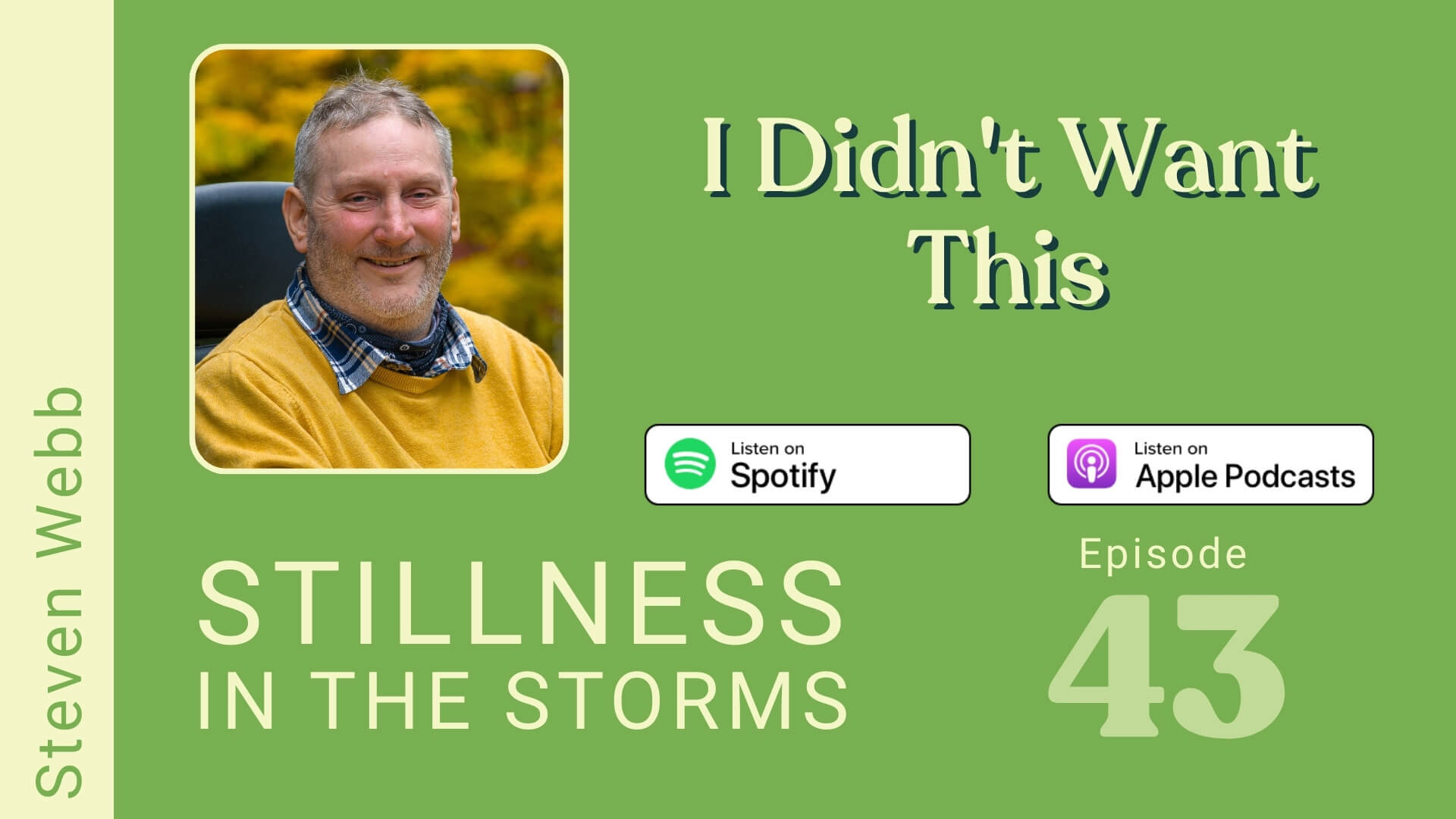
Now and again, you have one of those days, and this was one of them. I really couldn’t be bothered to do anything, let alone record a podcast.
How to Think Positive Even with a Negative Bias
Links to Steven Webb’s podcast and how you can support his work.
- Donate paypal.me/stevenwebb or Coffee stevenwebb.uk
- Steven’s courses, podcasts and links: stevenwebb.uk
I’ve realized that telling people to just think positive is one of the worst pieces of advice I’ve ever given. It seems so simple, right? Just be positive and live for the good stuff, but oh man, I was so wrong about that. Today, I’m diving into why it’s not really that easy and what we can actually do about it. We’re going to explore how our minds work and why we really can’t just flip a negative thought into a positive one on demand. So let’s unpack this together and figure out how we can take control of our thoughts instead of letting them run wild.
Just think positive, just look on the positive side of life. Really easy, simple anybody can do it. So why do the majority think in a negative way? It’s not as simple as thinking positive, and in this episode of Stillness in the Storms I explained why.
Stephen Webb takes us on an insightful journey through the complexities of human thought in this compelling episode. He starts by addressing a common piece of advice—just think positive—which he admits is not as straightforward as it seems. After years of sharing this advice, he has come to understand that simply trying to force a positive mindset can be both unrealistic and unhelpful. Instead, he advocates for a more thoughtful approach to our inner dialogue, one that honors the intricacies of our emotional landscape.
He breaks down the concept of the mind into three distinct parts: the instinctual mind, which reacts quickly; the subconscious mind, which draws from past experiences; and the conscious mind, where intentional thinking occurs. Each of these minds plays a vital role in how we process information and react to life’s challenges. Stephen emphasizes that while we cannot change a thought once it has appeared, we can choose how to respond to it. He likens thoughts to trains coming into a station, suggesting that we can let unhelpful thoughts pass without boarding them.
In a world where positivity is often glorified, Stephen reminds us that negative thoughts have their place too. They can alert us to potential dangers and help us navigate life more effectively. By recognizing and managing our thoughts, rather than suppressing them, we empower ourselves to create a more balanced mental state. This episode is a call to action for listeners to engage mindfully with their thoughts, encouraging them to choose which ones to nurture. It’s a refreshing perspective that highlights the importance of embracing all facets of our mental experiences for a more authentic and resilient life.
Takeaways:
- The advice to just think positive is overly simplistic and often unhelpful.
- It’s crucial to recognize that we cannot simply change a negative thought into a positive one.
- Our subconscious mind tends to reinforce the thoughts we focus on, whether they are positive or negative.
- Negative thoughts have evolutionary benefits that can keep us safe in dangerous situations.
- Learning to manage our thoughts involves choosing which ones to focus on rather than trying to change them.
- Emotional weight attached to thoughts determines how our subconscious mind prioritizes them in our awareness.
How to Think Positive Even with a Negative Bias
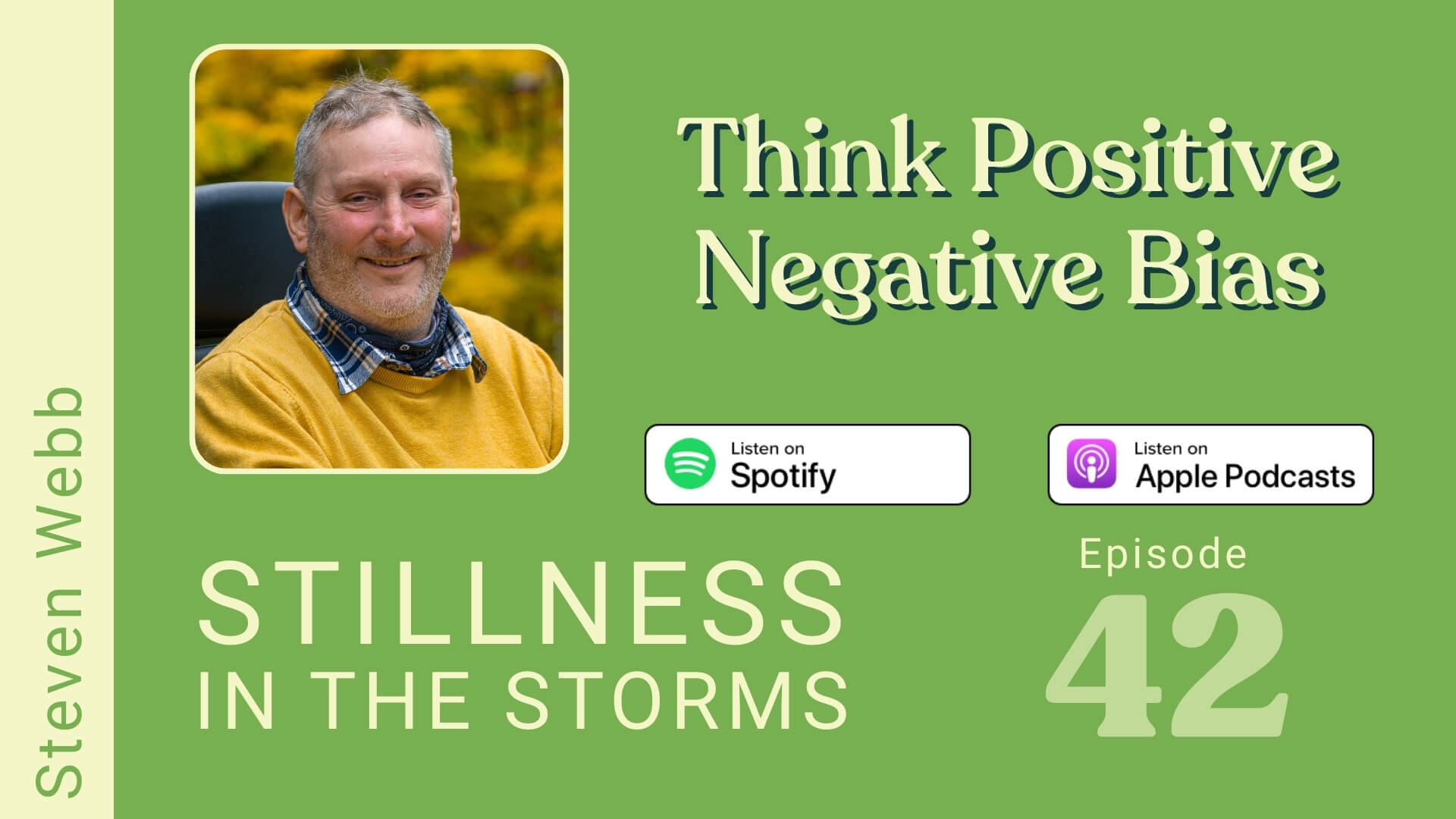
Just think positive, just look on the positive side of life. Really easy, simple anybody can do it. So why do the majority think in a negative way? It’s not as simple as thinking positive, and in this episode of Stillness in the Storms I explained why.
The Emotion That Stopped Me Living | What’s Yours?
Links to Steven Webb’s podcast and how you can support his work.
- Donate paypal.me/stevenwebb or Coffee stevenwebb.uk
- Steven’s courses, podcasts and links: stevenwebb.uk
Today, I’m diving into a big realization I had about shame and how it sneaks into our lives. I’ve been carrying this emotion for nearly 30 years without even knowing it, and it’s been holding me back from asking for help. It turns out that shame has been a huge part of my struggle, especially since my accident when I was 18. I’ve always felt guilty about needing assistance, but now I see that it’s time to face this head-on. By recognizing this feeling, I feel a newfound freedom that’s been missing for way too long. Join me as I unpack this journey and explore how facing our emotions can truly set us free.
I’m sure you’ve heard of shadows, those emotions and influences that have a large bearing on our lives yet we cannot see them. Nearly 30 years, I had no idea that this one emotion was holding me back. As I share my story of finding freedom, what about you? What emotion is holding you back?
I’m Steven Webb, your host, and sometimes we are far too close and when an ex says something that bites. Take notice.
The heart of today’s discussion revolves around a profound personal revelation that has taken years to uncover. Our speaker reflects on a conversation that revealed an unrecognized emotion: shame. This emotion, stemming from a life-changing accident at 18, has woven itself into the fabric of daily life, impacting decisions and feelings of independence. The speaker grapples with the complexities of needing help while feeling a deep-seated guilt for requiring assistance. This episode dives into the intricacies of human emotions and the importance of acknowledging them to achieve freedom and wholeness. Through personal anecdotes, we explore how shame can act as a silent barrier, subtly pulling us back from reaching out for support. The speaker’s journey towards understanding this emotion offers listeners a chance to reflect on their own barriers and the potential for growth that comes from confronting them head-on.
Takeaways:
- The realization of shame in my life has brought a new sense of freedom.
- Understanding that I can include all my feelings, both good and bad, is key.
- Asking for help has been a significant struggle for me throughout my life.
- It’s crucial to shine a light on our emotions to free ourselves from their hold.
- Recognizing that shame has limited me has opened doors to a more fulfilling life.
- Listening to others about what might be holding me back can lead to profound insights.
The Emotion That Stopped Me Living | What’s Yours?
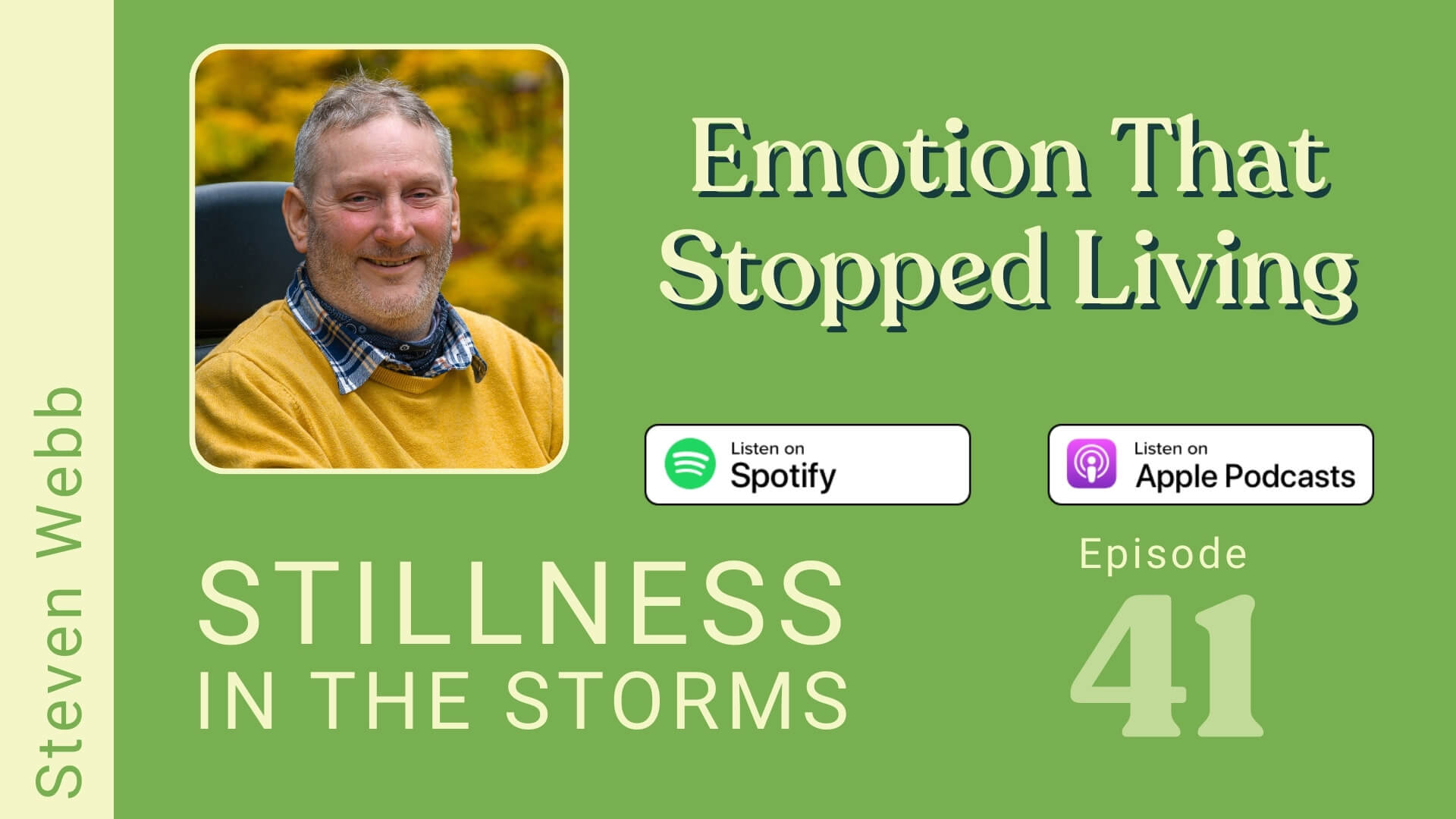
I’m sure you’ve heard of shadows, those emotions and influences that have a large bearing on our lives yet we cannot see them. Nearly 30 years, I had no idea that this one emotion was holding me back. As I share my story of finding freedom, what about you? What emotion is holding you back?
I’m Steven Webb, your host, and sometimes we are far too close and when an ex says something that bites. Take notice.
‘Based on a True Story’ – This WILL STOP You ARGUING
Links to Steven Webb’s podcast and how you can support his work.
- Donate paypal.me/stevenwebb or Coffee stevenwebb.uk
- Steven’s courses, podcasts and links: stevenwebb.uk
We’re diving into the myth of memory and how it messes with our heads, especially when we argue with family. You know how it goes—two people recall the same convo and end up at each other’s throats over who said what. I used to do this all the time with my sister. But guess what? Our memories are not as perfect as we think they are. I’ll share some insights that helped me stop the fighting, and it’s all about recognizing that both sides can be right and wrong. By understanding how memory works, we can chill out, have more compassion, and maybe even stop the endless debates over who remembers things correctly.
The podcast takes an enlightening dive into the concept of memory and how it affects our relationships, particularly with family. The host shares a personal story from his life about how he used to argue with his sister about their past conversations. It’s fascinating to hear him reflect on those moments, recalling how both of them were convinced of their own recollections. He emphasizes that memory isn’t as clear-cut as we often think. Instead, it’s more about how we reconstruct memories, often mixing them with emotions and fragments of other experiences. This realization has helped him reduce arguments with family, making conversations more peaceful. He encourages listeners to consider how their memories might be flawed too, and how understanding this can foster compassion and reduce conflict in everyday interactions. Overall, the episode is a gentle reminder of our shared human experience, highlighting that we’re all imperfect in our recollections and that it’s okay to be wrong sometimes.
Takeaways:
- Today’s episode dives into the myth of memories being perfect and how this affects our arguments.
- I share a personal story about how remembering things can lead to family arguments over misunderstandings.
- We explore how our memories are not as reliable as we think and can be flawed.
- Realizing our memories are imperfect helps us to stop arguing and accept different perspectives more easily.
- I encourage listeners to send in their gratitude stories, making our connections more meaningful.
- Understanding the emotional impact of memories can help us communicate better with our loved ones.
